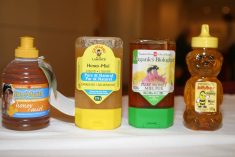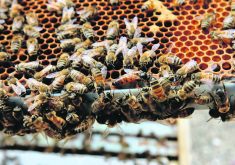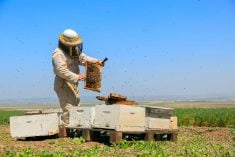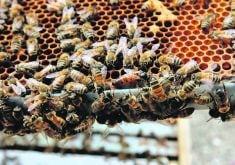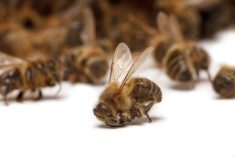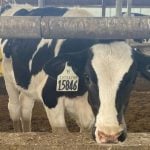Humans need bees, but the bees are in trouble.
So says Russ Crawford, vice-president of business development with ApiSave Bee Health Sciences.
The United States, for example, posted serious bee losses this spring. Survey results shared by the Honey Bee Health Coalition noted that, of the 702 beekeepers canvassed, mid-sized operations (50 to 500 colonies) averaged 54 per cent colony loss from June 2024 to February 2025. Commercial operations (over 500 colonies) reported 62 per cent loss on average.
Read Also
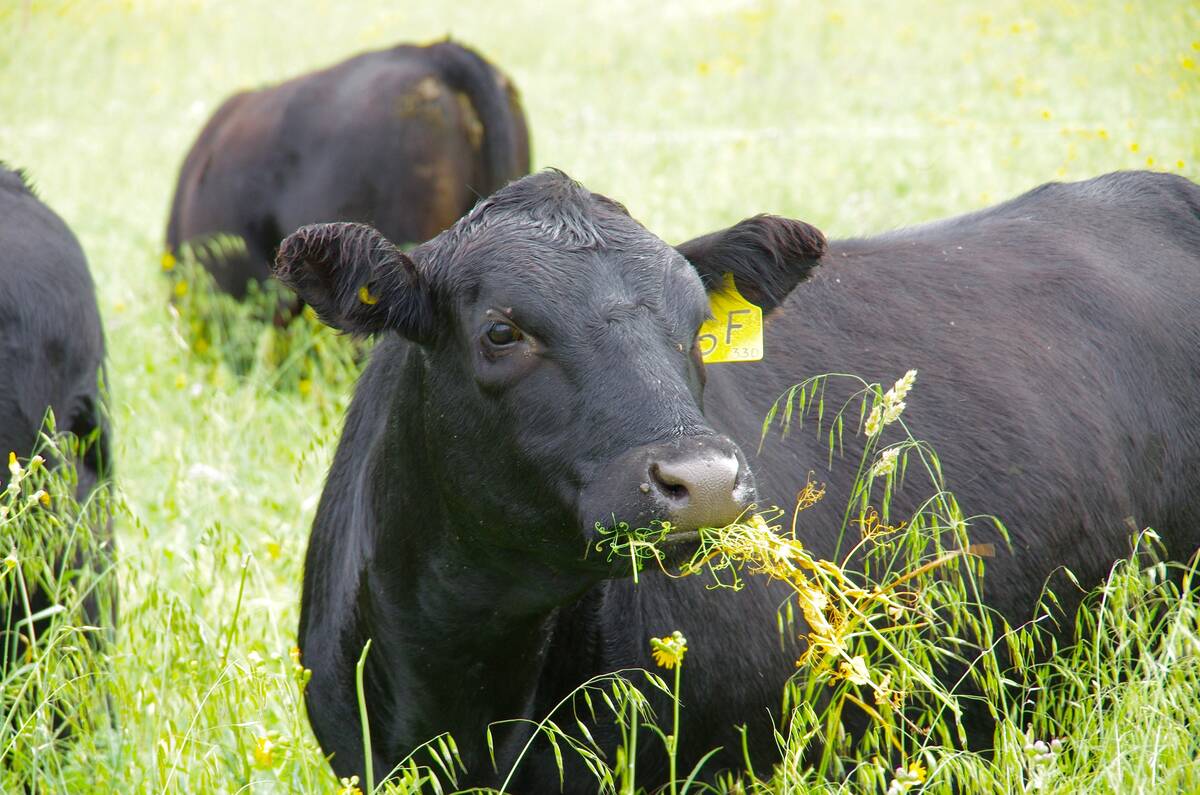
Canadian cattle industry has wins to shout about
Canada’s cattle management has become more efficient, more humane and more knowledgeable, but industry terms may not resonate with the general public.
Canada has its own woes. Every year, the Canadian Association of Professional Apiculturists puts out an report of winter bee colony losses. Since 2022, those averages have come in at 32.2 to 45.5 per cent. All those years were above the long-term average, recorded since 2007, the association said. The worst year, in 2022, posted losses almost twice the long-term average.
WHY IT MATTERS: Beekeepers in Canada have been struggling with bad winter loss years and challenges with varroa mites, who are not responding as well to standby control methods.
Crawford’s company, out of Port Coquitlam, B.C., says it’s got a solution to the colony collapse in Canada and elsewhere in the world.
Their product, also called ApiSave, is touted as an organic plant extract that can improve bees’ immune systems as well as acting as an organic pesticide against pests and disease. The company plans to develop two products, reflecting those two uses.
Lack of general bee health plays into why other threats have such a fatal toll, Crawford argued.
“Imagine if a cattle rancher or canola farmer lost 50 per cent-plus of their assets every year. The uproar and action would be incredible. But the greater financial loss is the impact on crop pollination provided by these bees. Those losses have been calculated to hundreds of billions of dollars.”

Their pitch earned the biotech firm an as-of-yet undefined sum during the Startup TNT 2025 Spring Agri-Food Investment Summit earlier this year in Regina. The event gives investment funding to agri-food startups and is backed by Farm Credit Canada. Most winners get around $200,000.
“Securing the top cash prize is great. We have a lot of projects on our agenda for 2025-26. Capital is always helpful,” wrote Crawford in an email to the Co-operator.
“But the exposure and networking offered by way of Startup TNT’s process is crucial to us in trying to create awareness around the plight of bees. The fact that 20-plus investors chose us above 38 other startups shows we are on the right track.”
From beer to bee health
ApiSave’s active compound comes from hops, the same crop used in beer brewing.
Originally the brainchild of ApiSave chief science officer Len Sarna, the hops extract is dried into a powder form to improve shelf life and reduce shipping costs. The powder is then placed in-hive and mixed into the bees’ food supply of powdered sugar.
The mites need to come in direct contact with the product. The idea, said Crawford, is that the bees will get the powder all over themselves, and then the mites will eat the solution off the bee, giving them a dose of ApiSave.
“Along with beer flavouring, hops has proven pesticide applications,” Crawford said. “(It has) GRAS (generally regarded as safe) status in the U.S., which opens doors for our solution a bit quicker.”
In Canada, the product still has a long regulatory and commercial road ahead of it, but it couldn’t come a better time, Crawford said.
He pointed to issues like foulbrood, a spore-producing bacterial disease. American foulbrood, in particular, can be a management nightmare for producers, although Canada greenlit a vaccine in late 2023.
The company cannot yet make any product claims without regulatory approval, but lab and field testing have found it 99.98 per cent effective against both American and European foulbrood and 84 per cent effective against varroa mites, according to Crawford.
That last bit was a surprise to developers. They didn’t create the product thinking that it would provide mite control.
“The pathology of a mite is quite different than bacteria,” Crawford noted.
The extract was tested for its effects on bee larvae infected with Melissococcus plutonius*, the bacteria that causes European foulbrood. Untreated control groups showed four per cent survival, the company reported. The treated group saw 80 per cent of larvae survive.
ApiSave has conducted six field trials — some in Canada and some in Mexico — to establish that the product is safe for bees. The number of hives in these trials ranged from 12 to 150. Resulting honey was found to be free of chemical residue, ApiSave says.
Product watched by honey sector
Rod Scarlett, executive director of the Canadian Honey Council, called ApiSave “promising” but is taking a “wait and see” approach until the commercial product hits shelves.
“I have been aware of the product for three years,” he said. “They’ve been keeping us updated on the scientific components of the product. It does sound very promising, and it appears that there seems to be science that agrees with their initial thoughts, that it can address bee health issues and pest issues.”
At this point though, any ray of hope against persistent production challenges is good news for the beekeeping sector.
“The toolkit for beekeepers is getting so precariously low, any introduction of a product that has a semblance of effectiveness is going to be welcomed by beekeepers,” Scarlett noted.

Crawford says the company has “orders for product to service 18,000 hives the moment we receive approval from Health Canada to market ApiSave as a veterinary health product.”
They expect the product to take off in Canada, the U.S. and Mexico, and have plans to spread into Australia and New Zealand by late 2026.
ApiSave’s road to Canadian registration
The company applied for Health Canada approval for its immune-boosting product application first. It’s simpler to get a veterinary health product registered, Crawford noted. The second product, classified as pest control, is going to be more involved.
The company expects the health agency will approve Apisave as a veterinary health product by June. If that happens, they plan to publicly launch the product in the last quarter of this year.
For the pesticide application, Crawford says approval by the Pest Management Regulatory Agency will likely stretch at least a year after the application is made.
Before applying to the PMRA, ApiSave hopes to add other plant-based ingredients to the formulation to achieve a varroa mite control goal of at least 95 per cent.
“We’re pretty confident we can do that,” said Crawford.
“Given the urgency, we hope to inject some emergency status into the process to get the much-needed product out to beekeepers.”
*Correction: A previous version of this story erroneously linked this result to a test for varroa mite, not Melissococcus plutonius.




